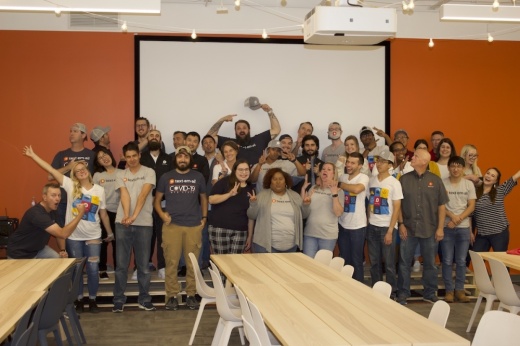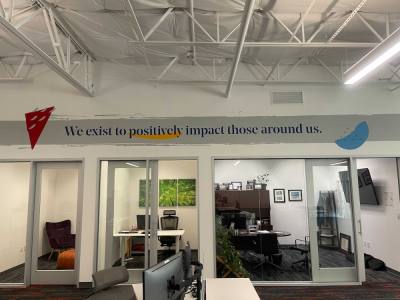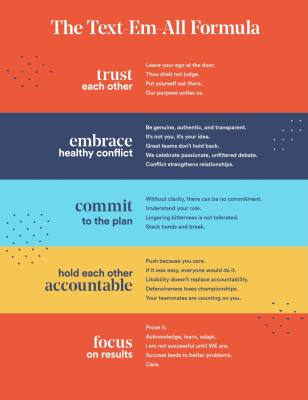A major differentiator for Text-Em-All is being a people-driven organization, which seeps into the company’s culture and touches everything from hiring, to coaching, to employee recognition.
“If you’re looking for a team to join, the one that focuses on you as a person, more so than the profit or dollar, is crucial,” said Sabrina White, Head of People Experience at Text-Em-All. “We care about doing great work and taking care of customers. The root of what we’re trying to do is people focused, and I think that’s why people enjoy working here.”
Text-Em-All, a Frisco-based software company that offers self-service mass text messaging and automated calling services, has several building blocks to serve as direction for how its employees operate on a daily basis. These start with the company values: compassion, authenticity and shared excellence, which are followed by Text-Em-All’s formula and manifesto. All of these “artifacts” are ultimately the foundation of the company’s culture, which has been key since its inception in 2005.
Having employee buy-in was crucial from the get-go. For example, the manifesto was created by employees to include phrases and statements about what makes Text-Em-All a unique company, ranging from “We do the right thing, even when no one’s looking,” to “We use our powers for good, not evil.” These artifacts are ideas that all employees collaborated on—they weren’t dictated from leadership.
“The idea here is for those things to guide us, everyone has to be involved to buy into it and live it every day,” Head of Marketing Ron Kinkade said. “It’s very intentional. We hire to it, and we coach to it.”
These company values and culture bleed into Text-Em-All’s hiring and coaching processes to find the best software engineers, account managers and customer experience specialists. The hiring process for all positions at Text-Em-All starts with a culture interview, which allows hiring managers to see if there is alignment in shared values. But even before the interview begins, prospective employees are asked a series of non-traditional questions during the application process, giving the company a way to get to know the individual on a more personal level.
“A couple of the questions are geared toward uncovering who that person is and whether our values align,” Kinkade said. “We want someone who is going to engage and answer honestly.”
The final step is a panel interview which gives members of the team a chance to interact with the prospective employee.
“I think getting a chance to talk with that person and understand what they may bring to the team helps with buy-in and the team overall knowing it’s a great fit,” White said. “We value the team’s perspective.”
The importance of culture continues when new employees begin the onboarding process. Employees aren’t thrown straight into their department work on the first day, instead they are given time to build interaction and trust with their coworkers and learn how each department functions and relates to the others.
“The beauty of having a culture where it’s real means you see it from day one,” White said. “A huge reason why our onboarding focuses first on culture is because we want to build a personal connection to what you’re witnessing and seeing everyday so you’re not an outside participant.”
The company built a digital version of its onboarding process in 2020 when the pandemic began, which led to a new challenge of trying to build highly interactive relationships through technology.
“We have a couple examples historically of crisis hitting, and for an organization like ours, it strengthens us every time,” White said.
This led to new creative opportunities for team building, including TEA Talks, short for Text-Em-All talks, which feature a random collection of team members and allows them time to build cross-department relationships. Plus, the company continued building upon its employee recognition program, which centers around its three values.
For Text-Em-All, living out company culture is more than just putting words on a piece of paper or website.
“You have to live it and do it every day, it takes a lot of work and effort,” Kinkade said. “It has to be built in from hiring, to coaching, to annual reviews, to career development. It’s hard work, but it’s worth it.”
The above story was produced by Community Impact Newspaper's Storytelling team with information solely provided by the local business as part of its sponsored content purchase through our advertising team. Our integrity promise to our readers is to clearly identify all CI Storytelling posts so they are separate from the content decided upon, researched and written by our journalism department.
Select your community
Support Us
News
- Austin Metro
-
Houston Metro
- Houston Metro Home
- Bay Area
- Bellaire | Meyerland | West University
- Conroe | Montgomery
- Cy-Fair | Jersey Village
- Cypress
- Heights | River Oaks | Montrose
- Katy | Fulshear
- Lake Houston | Humble | Kingwood
- New Caney | Porter
- Pearland | Friendswood | Manvel
- Spring | Klein
- Sugar Land | Missouri City
- The Woodlands
- Tomball | Magnolia
- Dallas | Fort Worth Metro
- San Antonio Metro









